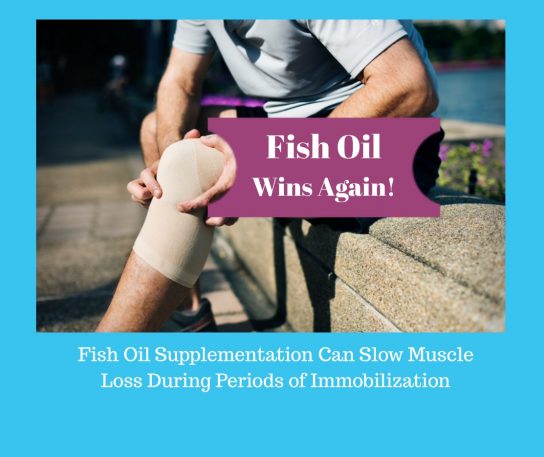Fish Oil Supplementation Can Slow Muscle Loss During Periods of Immobilization
Researchers enrolled 20 healthy young women (age range, 19-31 years) who were recreationally active (ie, active but engaging in structured exercise 2 days/week or fewer). They randomly assigned women to two groups: one group received an omega-3 fatty acid (fish oil) supplement (active group) and the other group received a sunflower oil supplement (control group).
Participants in the fish oil group consumed 2.97 g eicosapentaenoic acid (EPA) and 2.03 g docosahexaenoic acid (DHA). Both groups consumed the supplements for 4 weeks, at which time all participants had one of their legs immobilized for 2 weeks in a knee brace. During the immobilization phase, all participants were provided with all food to control protein intake to 1.0 g/kg body mass/day. Following the immobilization phase, participants then returned to normal activity for a 2-week recovery period. Leg muscle volume, strength, mass, and protein synthesis (based on blood and skeletal muscle samples) were evaluated before and after immobilization as well as after the recovery period.
Participants in the fish oil group lost significantly less muscle mass during immobilization compared with those in the control group. Further, whereas a significant decline in muscle volume was noted in both groups (P < 0.01), only those in the fish oil group regained full skeletal muscle volume following a return to regular daily activity.
These findings highlight “the potential efficacy of n-3 fatty acid intake to mitigate disuse-induced skeletal muscle atrophy,” write McGlory and colleagues.
“We are the first to show that n-3 fatty acid supplementation attenuates decrements in skeletal muscle size in response to unilateral leg immobilization in women,” write Chris McGlory, PhD, from McMaster University, Ontario, Canada, and colleagues.
The authors acknowledge that because the study enrolled only young women, these findings cannot be extrapolated to other populations such as men or older adults and that further studies are needed.
“The practical implication of these findings is that n-3 supplementation may be a viable strategy to offset muscle atrophy and promote recovery following periods of muscle disuse in humans, such as elective surgery,” conclude the authors.
At Botanica Medica our Naturopaths are well aware of the importance of exercise, a good diet and the effect it can have on your life both physically and mentally. They come across lots of interesting studies and are always updating their knowledge. If you would like to make an appointment with one of our Naturopaths call Botanica Medica on 8271-1827 today. They are only to happy to share the knowledge they have gained through their studies and patient outcomes, and get you feeling better. Botanica Medica is located at 97 Glen Osmond Road, Eastwood and appointments are available Monday to Saturday including some after hours.
Refrences
Fish Oil Supplementation Can Mitigate Disuse Atrophy in Women, Jennifer Garcia January 10, 2019
The study was published online January 10 in the FASEB Journal.
Chris McGlory, PhD, from McMaster
University, Ontario, Canada, and colleagues.
Artwork Created in Canva


Recent Comments